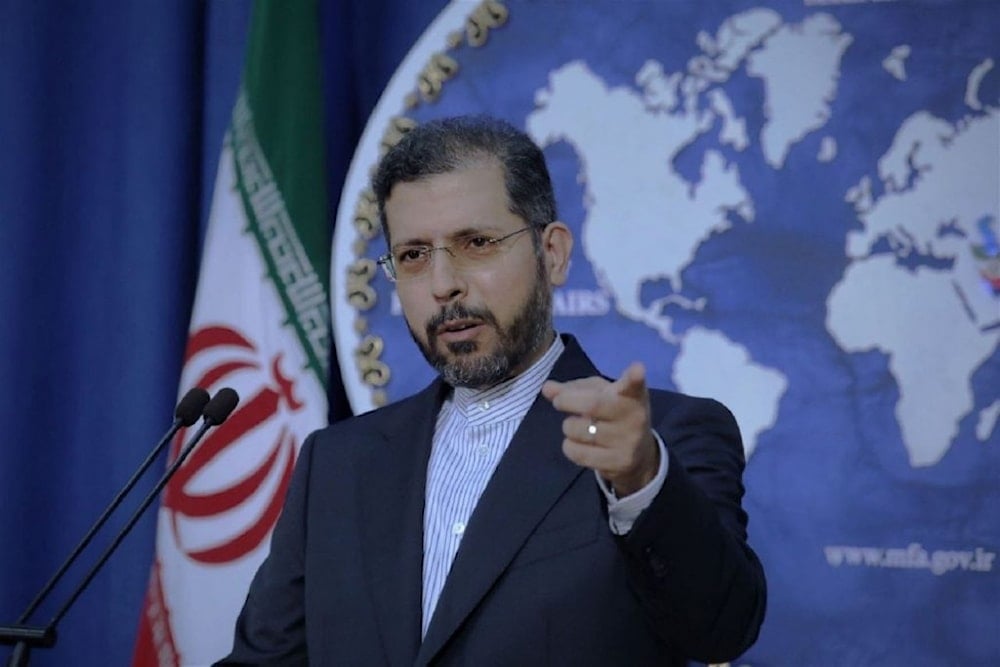Iran receives US messages on nuclear talks but says trust is broken
Iran says it has received messages from the US about restarting nuclear talks, but trust has eroded due to recent attacks and broken negotiations.
-

Iranian deputy foreign minister Saeed Khatibzadeh during a press briefing in Tehran, Iran (Mehr news agency)
Iranian officials confirmed on Tuesday that the United States has conveyed messages expressing interest in resuming nuclear negotiations, but skepticism over Washington’s intentions continues to cloud prospects for renewed diplomacy.
Saeed Khatibzadeh, Assistant to Iran's Foreign Minister, said that Tehran had received several indirect messages from the US in recent days indicating a desire to return to the negotiating table. However, he stressed that meaningful talks require a basic level of trust, something he argued has been undermined by recent hostile actions.
"Negotiations require a minimum level of trust, and the blatant aggression against Iran has practically left no room for it," Khatibzadeh said, referencing what Tehran describes as a US assault on its nuclear facilities. He further noted that Iran was "in the middle of negotiations" when the attack occurred, adding, "We were also in talks with the Europeans at the time of the American strike."
Despite this, he reaffirmed that diplomacy has "always been the fundamental principle" of Iran’s foreign policy.
According to Iranian news agency Mehr, a well-informed source stated that the United States, through mediators from several countries, had sent a formal request to Iran to resume discussions concerning its nuclear program.
Iran evaluating its next steps
Foreign Ministry spokesperson Esmail Baghaei confirmed that Tehran was currently reviewing its options regarding Washington’s outreach. "Iran's trust in the American side has been deeply damaged. There is absolutely no trust," he said.
Baghaei reiterated Iran’s commitment to international regulations and its compliance with safeguard agreements, emphasizing the country’s resolve to protect its national interests and dignity in the face of Israeli-American aggression.
He also pointed to growing international support for Iran in recent weeks, describing the global backing as “exceptional,” and praised the longstanding Iranian policy of regional cooperation. "Our policy of good neighborliness has proven to be highly effective," he added.
Earlier, US Special Envoy to the Middle East Steve Whitkoff claimed that a meeting with Iranian representatives regarding the nuclear issue was imminent. In response, Baghaei firmly denied any such plans, stating that "Iran has made no request for meetings with the American side."
Diplomacy and deception
Turkish Foreign Minister Hakan Fidan confirmed Ankara's role in relaying the US position to Tehran. Speaking on the sidelines of the BRICS summit in Brazil, Fidan revealed that he had discussed the matter in separate meetings with Iranian Deputy Foreign Minister Abbas Araghchi and Witkoff. He noted that Turkey had also raised the topic at the Economic Cooperation Organization (ECO) summit, underscoring Ankara's intermediary role in a rapidly shifting geopolitical landscape.
The renewed US interest in diplomacy follows widespread criticism of the Trump administration's pre-emptive military strike. As The Atlantic recently revealed, Trump had decided to attack Iran's nuclear facilities days before publicly suggesting renewed talks, an act widely seen as a calculated deception.
While administration officials declared the mission a success, US military assessments and independent experts have cast doubt on its effectiveness, pointing to limited damage and Iran's rapid repositioning of key nuclear assets.
Iranian Foreign Minister Abbas Araghchi has since laid out clear conditions for any future negotiations: the continuation of domestic uranium enrichment, complete sanctions removal, and a formal commitment not to pursue nuclear weapons. He added that any future diplomatic framework must take into account Iran's demand for reparations and reflect the new political reality following what Tehran considers an illegal act of aggression.
Adding to the diplomatic strain, Iran has suspended all cooperation with the International Atomic Energy Agency (IAEA) and barred its director, Rafael Grossi, from entering the country. Additionally, Iranian officials accuse Grossi of leaking sensitive nuclear data to "Israel," resulting in the murder of hundreds of civilians.

 4 Min Read
4 Min Read










